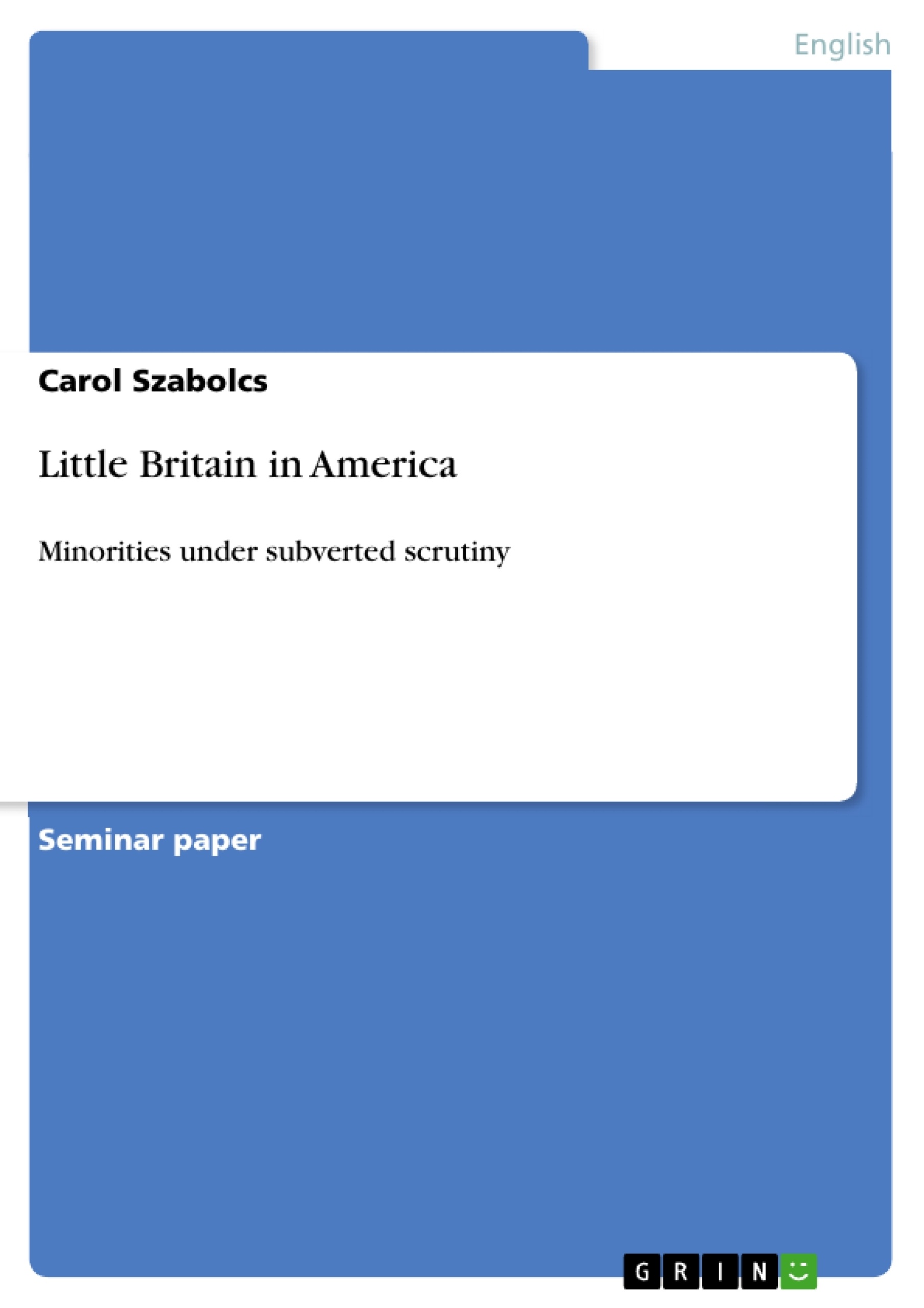Without any doubt Little Britain is one of the most observed British comedy productions
of this decade. For three seasons the audience has been entertained by witty remarks about
minorities in British society: immigrants, gays, lesbians, transvestites, people with special
needs, or people of different race and ethnicity – all of them became the butt of jokes. On
the contrary ‘classic’ jokes about for instance politics and politicians, celebrities or the
Royal Family appeared as support to the main-characters rather than being core topics of
the sketches presented in each episode.
Along with such a success criticism and questions arise concerning the alleged concept that
the writers Matt Lucas and David Walliams follow: entertainment on behalf of minorities.
Johann Hari (2005), commentator of The Independent, criticizes that “the show is cluttered
with ugly prejudices”. Fergus Sheppard (2005) of The Scotsman exclaims that Little
Britain is “not busting down prejudice, […] it’s probably just reinforcing it.” Does Little
Britain truly entertain on behalf of minorities? Do the jokes imply hidden racism, contempt
and hate towards minorities, which consolidate biases towards the minor parts of society?
Because of its success in and outside of the United Kingdom, the BBC and the producers
have decided to launch this comedy program in the United States, too. Although it would
be interesting to ask whether Little Britain will be able to maintain its concept in front of
the American viewers, this work will not intend to make any predictions. Instead it will
project the concepts of the sketches, and take a look at minorities that could become the
butts of jokes and name prejudices towards minorities in the United States that need to be
dismantled.
Table of Contents
- Introduction
- Ethnicity and race – the creation and function of otherness
- "The duplicity of the Asiatic" as humoristic substance
- "The bestial sexual license of the African" as humoristic substance
- Gender minorities - performance and performativity
- One is not born, but rather becomes, an unconvincing transvestite
- The only homophobe gay in the village
- Minorities as butts of jokes
- Prejudices towards minorities in the United States of America
- Hispanic Americans
- African Americans
- Arab and Muslim Americans
- How one becomes the butt of jokes
- The subversive power of jokes about minorities
- Conclusion
Objectives and Key Themes
This work aims to examine the portrayal of minorities in the British comedy series "Little Britain", analyzing the potential for humor and prejudice within its sketches. It will explore how the show's humor might contribute to reinforcing or subverting existing biases toward minority groups. * **The Construction of Otherness:** The paper will analyze how "Little Britain" constructs and reinforces stereotypes of minority groups, drawing upon the theoretical frameworks of Homi K. Bhabha. * **Humor and Prejudice:** It will investigate how the show's humor relies on stereotypes and potentially perpetuates prejudice against minorities. * **Gender Performativity:** The paper will examine the portrayal of gender minorities in "Little Britain" through the lens of Judith Butler's theories on gender performativity. * **Minorities in American Context:** The work will explore the relevance of "Little Britain" in an American context, identifying potential target minorities and the prejudices they face in the United States. * **The Subversive Power of Humor:** The paper will examine the potential for humor to challenge and disrupt existing social and cultural norms.Chapter Summaries
Introduction
This chapter introduces the concept of "Little Britain" as a comedic exploration of minority groups in British society. It raises critical questions about the show's portrayal of minorities and its potential for reinforcing or subverting prejudice. The chapter also outlines the focus of the work, which will be to analyze the show's concepts and potential impact on American audiences.Ethnicity and race – the creation and function of otherness
This chapter delves into the theoretical framework of Homi K. Bhabha, exploring how otherness is constructed through colonial discourse. It examines how Bhabha's theories can be applied to the portrayal of Asian and African characters in "Little Britain," such as Ting Tong Macadangdang and Marjorie Dawes.Gender minorities - performance and performativity
This chapter focuses on the portrayal of gender minorities in "Little Britain," utilizing Judith Butler's theories on sex, gender, performance, and performativity. It analyzes the characters of Emily and Florence, as well as Daffyd Thomas, to understand how the show portrays transgender identities and gay male stereotypes.Minorities as butts of jokes
This chapter examines the specific examples of prejudice and stereotypes directed towards minorities in the United States. It identifies potential target groups for "Little Britain" in America, including Hispanic Americans, African Americans, and Arab and Muslim Americans. This section discusses the existing biases, stereotypes, and challenges faced by these groups.Keywords
This work focuses on themes such as minority representation, humor, prejudice, stereotyping, cultural discourse, postcolonial theory, gender performativity, and the impact of comedy on societal attitudes towards diverse communities. Key concepts include otherness, colonial discourse, stereotypes, humor, and performativity.Frequently Asked Questions
What is the central theme of the analysis of „Little Britain“?
The work examines whether the comedy show reinforces or subverts prejudices against minorities through its sketches.
How is the concept of „Otherness“ applied in the show?
Based on Homi K. Bhabha's theories, it analyzes how characters like Ting Tong construct stereotypes of ethnic minorities as „the other“.
What role does gender performativity play?
Using Judith Butler's theories, the paper investigates the portrayal of transvestites (Emily and Florence) and gay stereotypes (Daffyd) in the show.
Which US minorities could be targets of a „Little Britain USA“?
The paper identifies Hispanic Americans, African Americans, and Arab/Muslim Americans as potential groups that face specific prejudices in the United States.
Does the humor in „Little Britain“ have a subversive power?
The analysis explores whether the jokes merely reinforce ugly prejudices or if they have the potential to dismantle them through satire.
- Quote paper
- Carol Szabolcs (Author), 2008, Little Britain in America, Munich, GRIN Verlag, https://www.grin.com/document/122678



